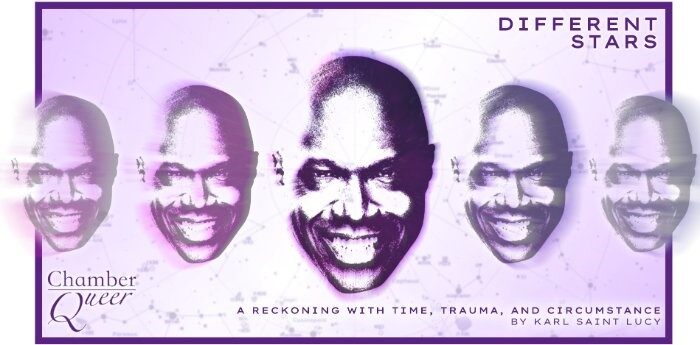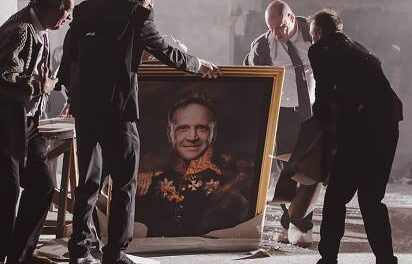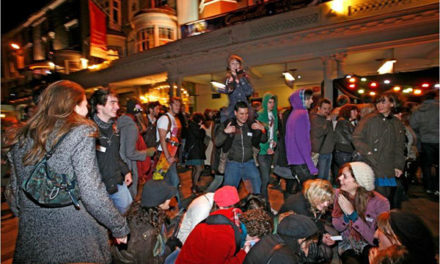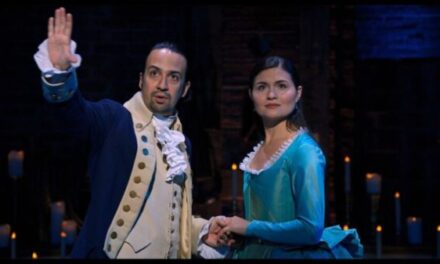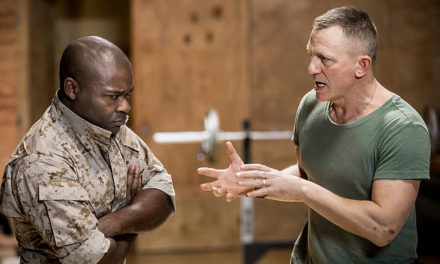On August 15, 2020 composer and performer Karl Saint Lucy, director Raquel Cion, and ChamberQueer will present Different Stars: A Reckoning with Time, Trauma, and Circumstance—a live-streamed queer song cycle that explores lost love in the time of self-isolation and COVID-19. Starring James Jackson, Jr., Victoria Huston-Elem, Danielle Buonaiuto, and Karl Saint Lucy, this song cycle has had a circuitous route to this incarnation. James Montaño sat down with Karl Saint Lucy for The Theatre Times and they discussed the development of Different Stars, a fascination with magic, and the necessity of stories about queer breakup.
James Montaño: Different Stars is described as a song cycle; a “Reckoning with Time, Trauma, and Circumstance.” How did this project come about?
Karl Saint Lucy: I went to the graduate musical theatre writing program at NYU for my MFA from 2010 to 2012. The thesis project was a collaborative musical and I was in the program as a composer. My dear friend Maria Alexandria Beech and I wrote a musical called Class together. In the midst of writing this 90-minute feature thesis musical, I kind of made my first real gay friend. And it turned into a romance. It failed spectacularly in almost a year.
The first song that I wrote for him was a setting of “Dame tu hora pérdida” by Julia de Burgos. He’s Puerto Rican and a big part of our relationship was him coming to terms with how he felt about the Spanish language. At that time, my goal was to sort of, ‘maybe I can write him something that will help him fall in love again with his language.’ So, I wrote that, but we broke up very soon after. I just kept writing and writing. I was trying to get through to him. He thought it was whimsical and frivolous, so there was the point at which it became not just about communicating with him, but about owning my own voice and owning my own sort of process of working through it; just me writing songs as therapy. It wasn’t until I had 40 songs that I’d been sitting on for a couple of years, when I was like, ‘maybe there’s something else I can do with this?’
We had a version of this that I was originally going to do in 2012 but that was canceled by Hurricane Sandy. In March, I was supposed to have a 70-minute premiere at Pangea in New York—the next incarnation. The show was set to be on March 23 (or something like that) and all the venues closed 10 days before, canceled by quarantine.
I had been like working as a live stream producer and was asked to take some of the shows I was working on online. In talking to Raquel, my director, dear friend, and long-term collaborator about this, I was kind of like, “You know, I’ve always said that this is a recital piece”—I pictured four to six singers just singing the songs back to back with no plot—”but I think that there’s maybe a character who’s an avatar for me?” She said, “Well, what if we just set it in quarantine? What if we just made that decision and really make you a character?”
I said, “You know, actually, that’s really interesting! We could have my character, we could have the character that represents my ex, and maybe have two female characters who represent his best friends, who were a lesbian couple.” We’ve cast James Jackson in my role—that was not something that I had originally intended, but we already had the cast lined up for the March performance. James is such a fucking talented actor and a much better of an actor than I am. I play Renaud (the ex) and we cast two actresses (Victoria Huston-Elem and Danielle Buonaiuto) as the lesbian couple.
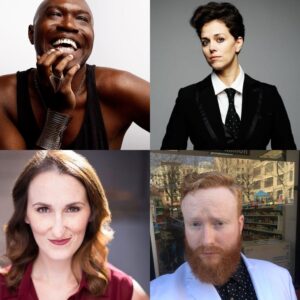
Top left: James Jackson, Jr. (Photo by L Morgan Lee); top right: Danielle Buonaiuto (Photo by Karjaka Studios); bottom left: Victoria Huston-Elem (Photo by Corey Rives Visual Art); bottom right: Karl Saint Lucy
I would say that the narrative is a memory play in a way: After a really long time of processing his relationship in the background, but not dealing with it, James decides that quarantine offers him an opportunity to open a box that he has never opened, stuff that he moved from the ex-boyfriend’s house. He goes through it and relives those memories and comes to a different understanding of that relationship, and, by the end, about himself.
JM: The title Different Stars also alludes to Shakespeare’s concepts of fate and unforeseen circumstances. Is that intentional?
KSL: Over time, I’ve become much more interested in this idea of ‘What does it mean that we meet each other at certain points in our lives, and we can’t change the circumstances?’ A big part of my reason for naming it Different Stars—calling back to Shakespeare—is this notion or question of what we could have changed if we had met each other under different stars. We were both very mentally ill at the time and what if we had been getting the therapy we needed? What if we met later?
The arc is that, at the end of the day, James has to take ownership of his own voice. There are three [of Shakespeare’s] sonnets that I’m using. Danielle, Victoria, and I get to sing a song—a sort of foil to the person who’s trying to find meaning and answers in Shakespeare. Ultimately, he finds that he has to deconstruct those concepts and that Shakespeare can’t be the end-all-be-all of ideal relationships. Shakespeare is so romanticized and, at the end of the day, when you’re sorting through a really intense relationship, you have to move on from romanticizing everything. In many ways, Shakespeare represents whiteness, Shakespeare represents a romantic ideal, and Shakespeare himself is queer-coded. I think some people would even say that Shakespeare is queer, but I don’t really have an opinion on that.
JM: Speaking of Shakespeare, queerness, and the idea of star-crossed lovers, currently, in some queer communities there seems to be a fascination with one’s star sign and the fate it holds, as well as an exploration of “queer magic.” How is queerness, queer concepts of magic, or astrological fate addressed in your work?
KSL: Contextually, this is still a song cycle. So, it doesn’t function like a musical; the songs don’t necessarily propel action forward. This is an entirely internal piece. But, definitely, a core of some of the pieces are ideas of queer magic and astrology. One of the songs, “Cancer” is a song I wrote this year. I was going through a relationship with someone who is a practitioner of magic.
However, my personal relationship with astrology started with the person who inspired this song cycle. While I’m a straightforward Cancer in every single way, he’s a very straightforward Virgo. I grew up in evangelical fundamentalism and I really didn’t have any contact with magic. I didn’t think there was anything to it. I left fundamentalism behind and I remember coming across this homo astrology book after the breakup. It goes through all the different matches and talked through the Cancer-Virgo connection. It was on-point for our relationship. I realized after the fact: every man I have ever had a crush on is a Virgo. Every single one (at that point). And I thought, “there’s something to this!”
But also, I think the real kernel of it for me was a Joan As Police Woman song called, “Start of My Heart.” I listened to that song obsessively after the breakup, which informed a lot of my aesthetic for this piece. She talks about walking towards Orion, the constellation, and I became really interested in what that means in the context of relationship. What does it mean to go towards certain constellations with someone?
As far as queer magic, it makes a lot of sense to me that this is a way that some queer people are led and practice. Because, at the end of the day, magic is a kind of response to oppression, right? It’s about cultivating power in a space that’s not limited to the physical, material reality around us—about cultivating interior space. I think it makes sense in a culture where queer people have no space and where queer people are continually disempowered. All of my early relationship challenges were over the top because I just didn’t have any context. I didn’t have any practice being in relationships. Magic is a way to cultivate that inner power. I know that a lot of people think it’s bullshit, but it’s informed much of my self-work and I do think that it’s an important lens to look at this piece through.
JM: Going back a little to Shakespeare and his most famous “star-crossed lovers”, Romeo and Juliet, one way of reading that classic romantic tragedy is that so much of their romance is about the first blush of love, which burns bright and fast. This song cycle seems to be inspired by one of your first real relationships. Is the first blush or rush of love important to this work?
KSL: I think it’s implied. It’s never directly said that this is James’s first relationship. Queer people face unique challenges when it comes to our first relationships. Often our first relationships are traumatic because we haven’t seen role models, because these relationships haven’t been modeled for us. We can come from dysfunctional homes where even straight parents are fucking nutcases. My hope would be that someone could watch this and understand that, whether this was the first blush of a relationship, it was still a very painful relationship.
JM: That’s one of the things about Romeo and Juliet. If you completely dismiss their first blush of love as adolescent foolishness, then the play falls apart. Shakespeare is giving their experience weight. He seems to have a bit of reverence for that aspect of the human experience.
KSL: I think culturally, we have an emotionally stunted blueprint for relationships that that is quite old. It’s worthy of respect, but it’s also worthy of introspection.
JM: While much of the music was inspired by your first relationship, it sounds like elements of newer relationships and experiences are woven themselves into this production.
KSL: Yeah. I’ve done a lot of personal work since this relationship. Meeting with Raquel and playing through the songs, I wept a bunch. This stuff really is still close to the chest for me. Our early relationships form a lot of our later relationships.
The song “Cancer” is influenced by not only that first relationship but a string of relationships that I’ve had since then. I said to Raquel, “What if we use ‘Cancer’ like ‘O Fortuna’ from Carmina Burana?” “O Fortuna” happens at the beginning and it happens again at the end. An important idea of Carmina Burana is the fact that all these things are cyclical. They’re all seasonal. Time repeats itself. I want that to come through, this notion of the echoes from these early relationships that continue to ripple down through time.
JM: This production is also a benefit for QORDS, a music summer camp for queer and trans youth. Can you tell us a bit about them and how they intersect with this project?
KSL: If I had had the experience as a youth of getting to go to a summer camp where I got to explore music, explore my identity, and talk about my sexuality and my gender confusion, I think that maybe this piece wouldn’t exist. I think that one of the mandates we have as queer adults is to pave the way for a better future and to give queer youths the tools to dismantle oppression and to take ownership of their own personhood. So, when I saw that this is a summer camp for trans and queer kids in the South, I was like, “Oh, that’s so in line with the ethic of this!” Which is, that queer people have to find a way to own their experience in a world that continually gaslights them and denies their experience.
JM: And this production is in many ways just like that: a way to talk about owning one’s queer existence and sharing their experience.
KSL: There was one director I was working on reading with and I kind of did the elevator pitch [of this project] with him. And he said, “Oh, a gay breakup song cycle. Just what the world needs; another one of those!” At first, it made sense, but then I thought, “Actually, that doesn’t exist!”
That sort of gives me momentum to do this piece in this way. I have to tell you, I’ve had a lot of insecurity about writing a show about my own experience and what it reveals about me and my own biases. But, at the end of the day, these don’t regularly exist for queer people—pieces written from a queer perspective that, in some way, identifies the queer experience at this moment.
The world premiere of Different Stars will be live-streamed on August 15, 2020 at 7 PM EST at https://www.differentstars.live/. It stars James Jackson, Jr. (Pulitzer Prize-winning A Strange Loop at Playwrights Horizons), Danielle Buonaiuto, Victoria Huston-Elem, and Karl Saint Lucy, with direction by Raquel Cion, costumes by David Quinn, audio engineering and guitar by Zac Selissen, bass guitar by Genevieve Chapin.
Co-produced by Karl Saint Lucy and ChamberQUEER.
This post was written by the author in their personal capacity.The opinions expressed in this article are the author’s own and do not reflect the view of The Theatre Times, their staff or collaborators.
This post was written by James Montaño.
The views expressed here belong to the author and do not necessarily reflect our views and opinions.

